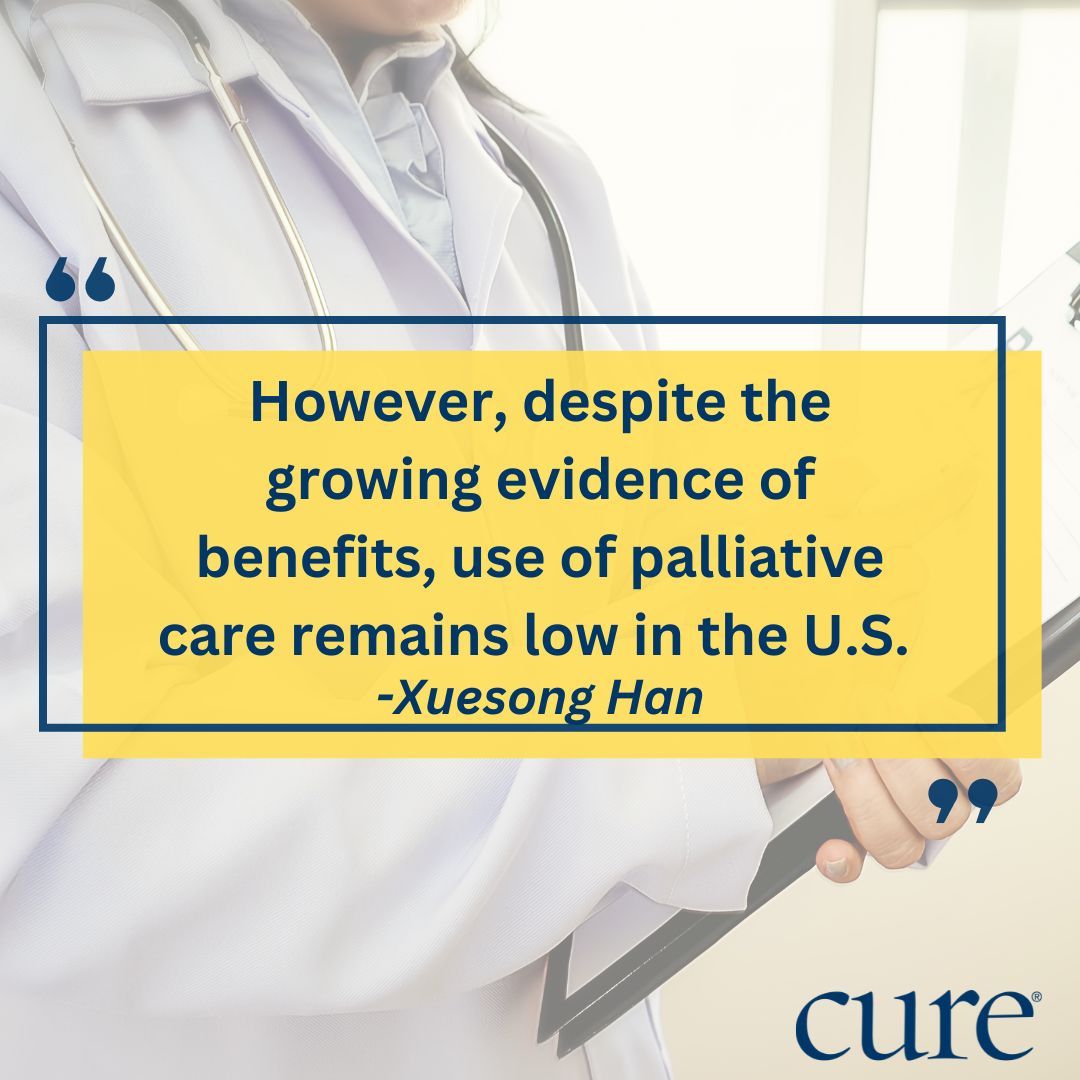Article
Navigating the Benefits, Access to Palliative Care for Advanced Cancer
Author(s):
Palliative care can benefit patients with advanced cancer by integrating advanced care planning, pain and symptom management and counseling, among other aspects.
Although many people associate palliative care with hospice care, experts emphasize the importance of squashing the misperceptions of palliative care and understanding how it can be beneficial, especially for patients with advanced cancer.
Xuesong Han, scientific director of health services research in the surveillance and health equity science department of the American Cancer Society, and her colleagues recently conducted and published a study, which found that more patients with advanced cancers received palliative care services. This increase may have been associated with Medicaid expansion under the Affordable Care Act, but utilization of this type of care still remains low.
CURE® spoke with Han to learn what exactly is palliative care, how it can benefit patients with advanced cancer and advice she gives to patients who may live in states where Medicaid was not expanded.
Why was it important for you and your team to conduct this study?
Palliative care usage remains low in the United States, an expert said.

Oncology guidelines recommended that patients with advanced cancer receive dedicated palliative care services early in the disease course, concurrent with active treatment. However, despite the growing evidence of benefits, use of palliative care remains low in the U.S.
Accumulating evidence indicates that the Affordable Care Act (ACA) has increased access to cancer care services by expanding insurance coverage. So we wanted to examine if Medicaid expansion, a major component of the ACA, is associated with changes in the receipt of palliative care among people with advanced stage cancers.
Our study findings confirmed our hypothesis, and this suggests that the expansion of Medicaid coverage may increase palliative care use and pointed to a potentially widening geographic disparity in receipt of the guideline-mandated palliative care between states with differential health policies regarding income-based Medicaid eligibility requirements.
Why is the use of palliative care still low in the United States?
Before our study, previous studies identified some barriers to palliative care include lack of public and professional awareness; workforce shortages and inadequate training; insufficient organizational capacity; and the lack of regulatory requirements and standards.
The topic of our study was health insurance coverage through Medicaid expansion, though all these barriers are not fully addressed. I think it is all contributing to the low utilization of palliative care.
What is palliative care and how it can benefit patients with advanced cancer?
Let me see if I can find the exact definition. ‘Palliative care is a patient- and family-centered approach to care for people with a serious illness that optimizes the quality of life by anticipating, preventing and treating suffering.’
So, it's actually collaborative, coordinated care. Usually, palliative care services included advanced care planning, pain and symptom management, and then nutrition, psychosocial and spiritual counseling.
There is a common misperception that palliative care equals hospice care, but actually they are different. Hospice care is only a type of palliative care that's given at the end of life without curative intent. But palliative care can be used at any stage of illness and can be with or without curative treatment.
Is palliative care meant to be a short-term or long-term approach?
It can be long term for people with serious illness. Specifically for advanced-stage cancer, the implementation of palliative care is recommended as a patient starts curative treatment.
What advice would you give patients who may live in states that did not expand Medicaid? How should they advocate for themselves to get palliative care?
First, patients can educate themselves and family members about the benefits of palliative care and correct the misperceptions, if any.
Second, they can also bring this up if they are in communication with the care team and request more information and the referral. For those who live in states without Medicaid expansion and who are not insured, they can oftentimes find palliative care programs, particularly those associated with hospice, which receive philanthropic support or provide charitable care.
Third, I think patients and families can also advocate for Medicaid expansion and the legislations supporting access to palliative care and supportive care in their states. They can advocate for these policies that support access to palliative care and supportive care by voting in elections for candidates that support these policies.
For more news on cancer updates, research and education, don’t forget to subscribe to CURE®’s newsletters here.
2 Commerce Drive
Cranbury, NJ 08512
All rights reserved.




